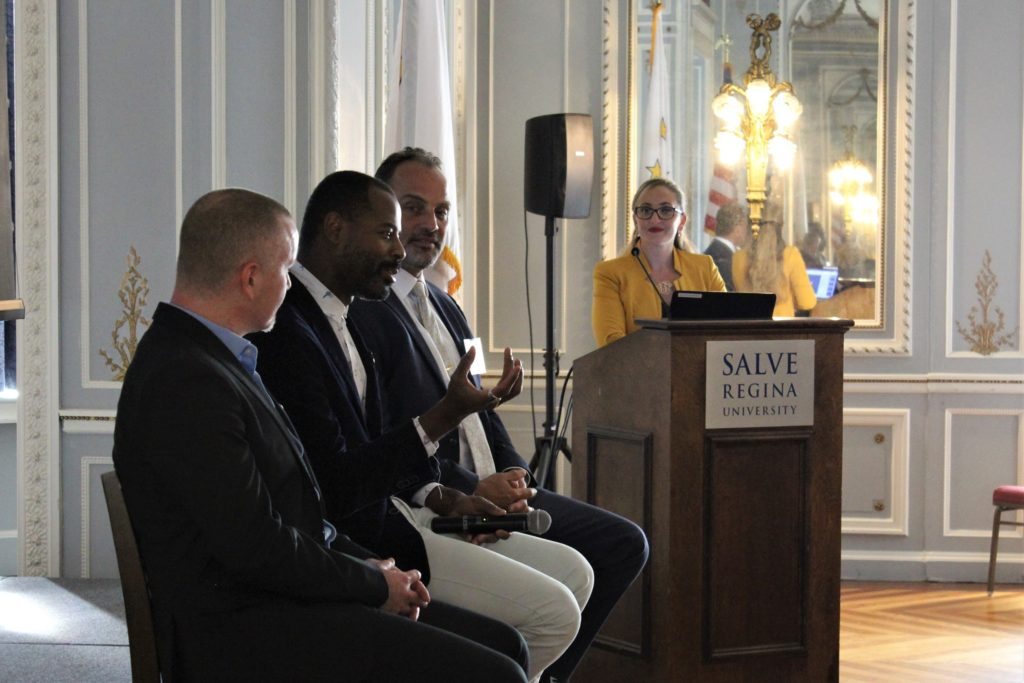Pell Center Hosts Half-Day Joint Cybersecurity Awareness Event
Newport, R.I. – The Pell Center hosted a half-day Cybersecurity Conference in partnership with the RI State Police’s Joint Cyber Task Force, SENEDIA, and OSHEAN on the occasion of the 16th annual National Cybersecurity Awareness Month (NCAM) on October 24, 2019. The event covered some of the most pressing cyber threats affecting small and medium-sized businesses (SMBs) and local governments and municipalities, the growing market for cybersecurity jobs, and the need to build a culture of cybersecurity across organizations. The conference was a part of the Rhode Island Corporate Cybersecurity Initiative (RICCI), an ongoing effort designed to bring senior leaders across various industries together to discuss the most pressing cyber threats facing corporate and public sector leaders in the digital age, while promoting best practices to prevent, protect, mitigate, respond, and remediate cyber incidents.
Pell Center Senior Fellow and head of the Pell Center’s Cyber Leadership Project, Francesca Spidalieri, moderated the discussion and contributed insights from her research and publications on the subject. Renown cybersecurity experts discussed some of the latest cyber threats including ransomware attacks, which are a significant and growing risk for SMBs, as well as municipal and state agencies, and covered best practices to minimize the spread of malware and mitigate damages.
In his keynote address, Cybereason’s Chief Information Security Officer (CISO) Israel Barak discussed the increased number of SMBs and municipalities across the United States that have become lucrative targets of ransomware attacks and the trend of increasing ransomware demands. He noted that the U.S. is now the third largest market for ransomware in the world. Mr. Barak also explained the long-term consequences of a ransomware attack that are not alleviated by paying the ransom. “Once an attacker is in your system, they have access to your credentials which can then be sold on the dark web.” Secondary breaches an also occur when attackers leave “backdoors” open that can later be used to re-infect the organization. He emphasized the fact that disaster recovery measures do not necessarily ensure security resiliency and organizations need to have working backups to restore compromised systems.
Matthew Wainwright, CISO for the Town of Middletown, R.I. followed Mr. Barak’s address, sharing his experience with cyber risk management and the use of Artificial Intelligence (AI) and machine learning to improve visibility into an organization’s network and automate detection of cyber threats. Mr. Wainwright covered various measures to combat cyber threats, including AI systems that can produce real-time, active responses to in-progress attacks, while monitoring potential threats and generating reports using case-based reasoning. He encouraged local governments to collaborate in combatting cyber threats by sharing funding and information to increase security and resilience.
O’Shea Bowens, CEO and Founder of Null Hat Security, concluded Thursday’s session by sharing a personal perspective. Mr. Bowens emphasized the importance of developing clear objectives, roles, and responsibilities when creating a cybersecurity risk mitigation plan and having an open relationship with IT staff, as they are “your best eyes on the ground [and] the best front-line defenders.” He also encouraged cybersecurity professionals to maintain a constant connection with the community or organization they are responsible for protecting, as “people to people insight” is the first level of threat intelligence.
For more information on the Pell Center’s RICCI initiative, visit the RICCI webpage.
[/vc_column_text][/vc_column][/vc_row]
